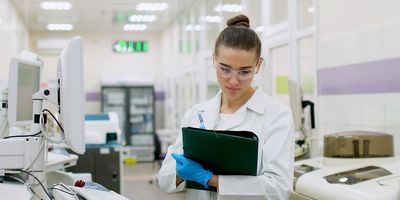Five Tips to Improve Your Lab Quality
Developing an effective quality management system drives improvement
A lab’s reputation is closely linked to the quality of the science they produce. High lab quality will help to establish trust and better communication with key stakeholders. There are many ways to drive high lab quality, but the best is through a systematic quality management system (QMS) that enables improvement, defines roles, documents outcomes, and finds the right balance between accuracy, speed, and cost for the lab.
Here are five tips to help improve quality in your lab:
Develop an effective quality manual
A quality manual is a top-level document that describes the elements of the QMS. It should start with a statement of the intent and goals of the program, written in a way that is meaningful to all lab staff and supports the strategic direction of the lab. Next, it should define the roles and responsibilities of everyone in the lab with respect to quality. It should then cover how the lab intends to ensure high-quality outcomes, meet any regulatory requirements, and practice appropriate quality management around the lab.
Document important procedures
One of the most important components of an effective QMS is the library of standard operating procedures (SOP). SOPs document how the lab will act in different situations. They contain clear, concise, and concrete instructions on a wide range of lab activities. Some important SOPs are those that cover: the execution of standard lab methods, how quality activities are accomplished, explicit instructions on sample handling, and approaches to stakeholder interactions. It is also important to document any other lab activities that could impact technical outcomes, such as staff training, purchases, calibration and metrology, calibration standards, and round-robin testing.
Enforce proper data management
Proper data management covers the entire life cycle of a technical project. It begins with ensuring that the right experiments or tests are conducted in the lab—and that they follow the appropriate SOPs. As data is created, the data management process ensures that data is traceable, unaltered, and protected. It also ensures that all of the data is retained, including observations, metadata, experimental details, and measurement uncertainty. Best practices extend to a full review of data and results prior to reporting, and appropriate archiving.
Include stakeholder satisfaction
Ultimately, lab quality needs to drive positive outcomes for the key stakeholders of the lab. An effective QMS includes approaches to ensure the technical work meets the stakeholder requirements, and that the lab possesses the skills, tools, time, and procedures to deliver on the expected work.
The QMS also needs to address how lab staff communicate with stakeholders. It should provide guidance around clear and prompt communication, effective follow-up, and how to properly address complaints. Effective communication is a key component of stakeholder satisfaction.
Engage staff with quality
To successfully improve quality, lab staff must be engaged with the process in the lab. It is the responsibility of the lab manager to communicate the importance of the QMS, why it benefits both the lab and the staff, and how it helps to drive success. A good quality system must be integrated into the culture of the lab, not an extra activity tacked to the side of the technical work.
Having an effective QMS helps labs consistently deliver quality science, building trust with both staff and stakeholders in the process.
Embark on a transformative journey in lab management with the Lab Management Certificate program from Lab Manager Academy. We understand the challenges you face in maintaining lab quality, and we're here to support you every step of the way. Our program empowers you to overcome resistance to change, nurture staff engagement, and kindle innovation within your lab, all while fostering a culture of warmth and collaboration. Your lab's brighter future starts right here, and we're excited to be part of your journey. Discover more about the Lab Management Certificate program here.


